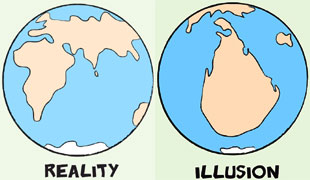Ilankai Tamil Sangam30th Year on the Web Association of Tamils of Sri Lanka in the USA |
|||
 Home Home Archives Archives |
Only the Truth Can Give Us True FreedomDaily Mirror editorial, Colombo, April 3, 2012
As we move into April and prepare for the National New Year – the only major cultural festival that the Buddhists and the Hindus celebrate together - it would be the ideal time for the government to initiate courageous and practical steps to bring about national reconciliation. We need to learn the right lessons from the past, but living in the past often brings us to a dead-end.
On the other hand Tamil analysts accuse the Sinhala governments of betraying the Tamil community by scrapping the Bandaranaike–chelvanayagam pact in 1959 and the Dudley-chelvanayagam pact in 1967 for the devolution of power. Whatever may have happened or not happened, Sri Lanka after independence first saw largely non-violent protests or Sathyagraha by Tamil political leaders for equal status and sharing of power. When language, education and other rights were denied to the Tamil community, the non-violent protests turned into a bloody thirty-year war with ruthless terrorism in which hundreds of thousands of people were killed, injured, displaced or made destitute and forced to languish in varying degrees of degradation. After three decades of Sathyagraha and three decades of war, the government now faces unprecedented international pressure to bring about national reconciliation and address accountability issues relating to alleged war crimes during the final months of the conflict in 2009. The Lessons Learnt and Reconciliation Commission (LLRC) in its widely-hailed report and recommendations has given the government a good opportunity to learn from the past and go forward to achieve the vision of lasing national unity in diversity through social justice. Independent analysts who love the country but do not indulge in the pseudo patriotism of power-hungry politicians are warning that if the main LLRC recommendations are not implemented, the country could end up as a pawn of international and regional super powers. For the government this month of the National New Year could be the time when it faces its moment of truth literally and otherwise. During the past few years we have been loaded with lies and damn lies, deception and double games, rampant corruption, frauds and a colossal waste of public money. Instead of the rule of law, we have seen the worst ever lawlessness with party political thugs or hooligans having their way. Good governance, democracy, media freedom and transparency have gone with the wind. Despite false or bloated statistics, the economy also is crumbling amid a soaring cost of living – and only the truth can lead Sri Lanka into real and lasting freedom and development. |
||
|
|||
 Some extremist Sinhala historians in TV talks and other speeches often accuse the Tamil community of wanting not just a federal or separate state but even at one time trying to control the whole of Sri Lanka. One such extremist in a TV debate last week accused the Tamil community of trying to do what the white minority apartheid regime did in South Africa till the legendry Nelson Mandela led a largely peaceful revolution to restore justice. The Sinhala historian said that when the Donoughmore constitution was being drafted in 1930, the Tamil community did not want just a federal state but control over the whole of Sri Lanka because they believed they were the top professionals and intellectual elite who could rule the country effectively.
Some extremist Sinhala historians in TV talks and other speeches often accuse the Tamil community of wanting not just a federal or separate state but even at one time trying to control the whole of Sri Lanka. One such extremist in a TV debate last week accused the Tamil community of trying to do what the white minority apartheid regime did in South Africa till the legendry Nelson Mandela led a largely peaceful revolution to restore justice. The Sinhala historian said that when the Donoughmore constitution was being drafted in 1930, the Tamil community did not want just a federal state but control over the whole of Sri Lanka because they believed they were the top professionals and intellectual elite who could rule the country effectively.